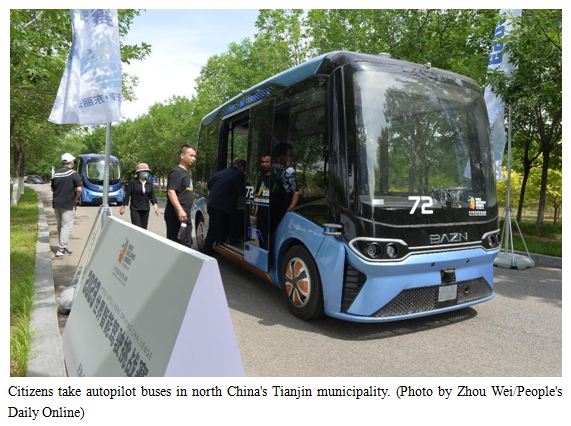
By Xu Peiyu
Thanks to the rapid development of the new generation of information technology, vehicles are becoming more and more intelligent in China.
The country is witnessing the blossoming of smart connected vehicles and the internet of the vehicle industry. Urban traffic management has been improved, which provides better travel experiences for passengers.
Vehicle Internet is an interconnect feature that accesses the network for in-vehicle devices through wireless communication technology. With the Internet of Vehicles, dynamic vehicle information can be uploaded to online platforms and thus provided various services during road racing.
It is mainly applied in assist pilot, auto pilot and intelligent traffic management.
The internet of vehicles can actually improve people’s travel experiences. An executive at Chinese automaker BYD told People’s Daily that the company’s vehicle internet now has applications for all scenarios.
Before entering a BYD vehicle, the owner can remotely unlock the car, check the air conditioning, disinfect the interior and check the vehicle status on a mobile application. BYD vehicles are equipped with rich driver assistance functions that make driving easier in multiple scenarios and provide various entertainment services when parked.
In addition, users can lock vehicles on mobile phones and check vehicle information anytime, anywhere after leaving the cars.
Autopilot has been constantly expanding its application scenarios, which not only makes people’s daily lives easier, but also improves traffic efficiency. Today, many express parcel delivery vehicles, street sweepers and tour buses are unmanned and circulate both on closed roads in parks and on open roads in cities.
It is also used by container trucks in port areas. For example, containers at a terminal in Taicang Port in east China’s Jiangsu Province, after being lifted by automatic quay cranes, are transported by self-driving container trucks to their destinations along the driving paths measured by the system.
The intelligent transportation system enabled by the internet of vehicles is driving forcefully the construction of smart cities. Wuxi City in Jiangsu has built a national intelligent traffic comprehensive test center, which, based on traffic management data collected by the police, reminds drivers of illegal vehicle processing, city roadblock information, as well as safety and emergency warnings.
In Suzhou, Jiangsu Province, passengers disembarking from high-speed trains can board self-driving buses immediately after exiting the train station or order unmanned taxis on mobile applications.
According to statistics released by the Ministry of Industry and Information Technology (MIIT), 7 million intelligent connected vehicles with driver assistance systems were sold in China last year, an increase of 45.6% year on year. During the same period, 48% of new energy vehicles in the country were equipped with driver assistance systems.
China’s smart vehicle market could reach nearly 1 trillion yuan ($138.65 billion) by 2025, according to a white paper released by the China Academy of Information and Communication Technology.
In April this year, MIIT announced the construction of national Internet of Vehicles pilot zones in Xiangyang, central China’s Hubei Province, Deqing, east China’s Zhejiang Province, and Liuzhou, south China’s Guangxi Zhuang Autonomous Region. So far, China has approved seven such pilot zones, including previously unveiled ones in Jiangsu, Tianjin, Hunan and Chongqing.
The vehicle Internet system in the Wuxi pilot area can warn drivers of puddles and ice on the roads with situational awareness technology and vehicle-mounted sensors, which improves traffic safety. In Wuxi High-Tech District, two routes have been designated for autopilot logistics, benefiting large enterprises and connecting with local unmanned factories.
The Tianjin Pilot Zone, a municipality with a strong automotive industry chain, took the initiative to set up a service system for the development of the Internet of Vehicles and explore ways of commercial application. It has become a world-class pilot zone combining Internet of Vehicles research and development, testing and commercialization.
The national IoT pilot zones have been expanded, releasing a signal of China’s accelerated layout in the development of IoT and intelligent connected vehicle industry, said Feng Yi, director of China Automotive Technology and Research Center.
“As an emerging form of business, the Internet of Vehicles has become an important engine driving the high-quality development of the automotive industry,” Feng added.
MIIT Deputy Chief Xin Guobin said China had, to date, designated more than 15,000km of roads to test smart connected vehicles and was also expanding the use of driverless taxis and buses, self-parking and unmanned delivery vehicles.
In addition, more than 7,000 km of roads have been upgraded to smart connected vehicles with more than 7,000 sets of road equipment in China’s 17 nationwide demonstration bases for testing smart connected vehicles, 16 pilot cities for coordinated development of infrastructure for smart cities and smart connected vehicles, and seven national vehicle Internet pilot zones.
